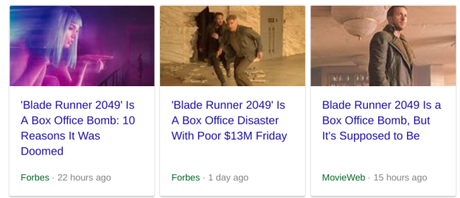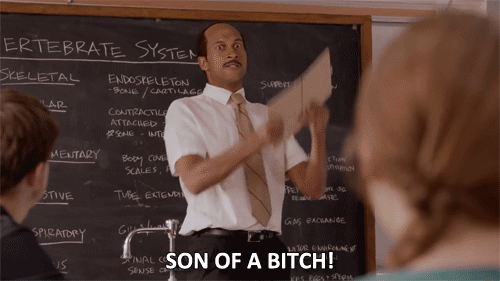2017 is supposed to be the year of RottenTomatoes, the year of quality winning out over crap or mediocrity. To put butts in seats this year films have to be good, really good in fact. The days of phoning it in and lazily relying on brand recognition are over. You hear that, Hollywood. We're mad as hell, and we're not going....

Oh, come on! 2049, Denis Villeneuve's sci-fi masterpiece, bombed (to the tune of $31m domestic, $81m worldwide on a $155m budget, after rebates)?

You know, earlier this year when War for the Planet of the Apes surprisingly turned into the lowest-grossing film in the franchise I wrote it off as an exception. For whatever reason, that movie just didn't click with audiences despite the glowing reviews. However, for the most part the rest of the year has uncommonly seemed like a meritocracy. The best movies have made the most money (well, apart from Despicable Me 3, which quietly crossed a billion worldwide). Ergo, Blade Runner: 2049 would surely ride its euphoric word of mouth into box office glory.
Sure, Tron: Uprising already showed us the folly of trying to convert a sci-fi cult classic into a blockbuster franchise, and similar cases like Mad Max: Fury Road were never quite as financially successful as we mistakenly believed them to have been.
Sure, the 2049 trailers didn't do jack squat to get non- Blade Runner fans interested, other than shouting "look, there's Ryan Gosling" and "look, there's Harrison Ford being a mean old man again" and "look at all dem there purdy pictures."
Sure, the marketing department enacted draconian guidelines for reviewers and journalists which prevented them from using any actual plot details to try and help hype up the movie.
Sure, an R-Rated, 163 minute-long movie is a big ask in this day and age. To many of the parents who might want to see 2049, that's simply too much babysitting time to pay for.
Sure, 2049 is slow and ambiguous at a time when audiences want instant gratification.
Sure, 2049 doesn't completely require you to have seen Blade Runner beforehand but is definitely best enjoyed if you have.
Sure, if you did try to seek out Blade Runne r on Blu-Ray to catch up you most likely found one store and online retailer after another that was either completely sold-out or had only a few left they were hawking for over sixty bucks, forcing you to simply rent a digital copy from somewhere or just give up.
Sure, 2049's advertising didn't do much to reach out to female audiences, other than to maybe lean back on "the ladies love Gosling, right?".
Sure....
Actually, hold on. Why are we supposed to be surprised 2049 flopped? Oh, yeah. The reviews. Right. Right, right, right. Well, even in 2017 good reviews can only get you so far.

The real problem, as Deadline explained, is this: 2049 is ultimately a one-quadrant movie that was made and sold as a four-quadrant movie. That's just a fancy way of saying they spent too much money on something that was always going to have a limited appeal:
You don't build a movie that costs in excess of $155M net for just one quadrant -older males (guys over 25 rep 53% per PostTrak)- and mount a campaign that's shrouded in secrecy, thus sidelining a brand new potential generation of fans. Also, if you're looking to hook the Marvel or DC crowd into this reborn franchise, a PG-13 rating could have assisted Blade Runner 2049 without selling its quality short (there's nothing really dicey in the movie violence or sex wise). If you're going to build a movie for one quadrant, it can't be at a $100M-plus price. Plain and simple.
Alcon Entertainment, which has handled the marketing and financing whilst leaving the distribution duties to WB (domestic) and Sony (international), was clearly banking on quality carrying the day. They gave 2049 the same mystery-box-marketing treatment as Disney did with The Force Awakens, but in so doing they massively miscalculated how many people would be enticed by the mere tease of more Blade Runner. You say, "Here's the new Star Wars and we're telling you nothing about it," and millions upon millions will show up because, dude, it's Star Wars. You say the same thing with Blade Runner, and you get what just happened.
To be fair, Alcon also made several poorly-promoted 2049 prequel shorts, like this one:
It's all such a depressing shame. Two major studios and one production company aggressively backed the uncompromising vision of a director who was fresh off of an impressive run of critical and financial hits ( Prisoners, Sicario and Arrival, the latter of which became Villeneuve's first film to break $100m domestic). They trusted him to honor the spirit of a beloved cult classic that has influenced a generation of filmmakers and fans while also updating it for the modern day. And then they ran an outwardly confident marketing campaign that was eventually matched by reviews which indicated the film is exactly as good as the trailers seem to think it is.
But it's not that simple. Quality doesn't always win out, especially if you massively overpay to achieve it. These days, there is always some amazing film playing (or streaming) somewhere or some amazing TV show available to stream on some device, and there are always people online screaming to the heavens that we're all idiots if we don't make the time to see these masterpieces of film and TV. That is the steady drumbeat of critical response, and to become more than just another little-watched, but ardently adored product you have to somehow monetize that response and galvanize audiences through enticing advertising, a multi-pronged social media strategy, a fair bit of luck in terms of timing and competition and an oversupply of good, old-fashioned word-of-mouth that spreads to people of all ages. 2049 did exactly enough of that to be a success if it was a movie that cost a fair deal less than $100m to make. As is, though, it's a disappointment, but it was probably always going to be, modern classic or not.
Or maybe this world just isn't worthy of/ready for 2049 yet. I don't know if that's true or fair, but it sure makes me feel better to say it.

